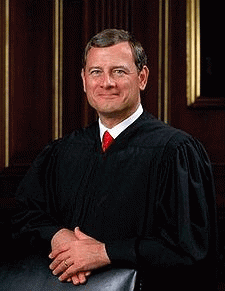A recent court decision of 5-to-4 in the case of Herring v. United States shows that the “exclusionary rule” may be at risk and the man leading the onslaught on the rule may be Chief Justice John G. Roberts, Jr, a Bush Administration lawyer through and through who many now know as the guy who fumbled words when administering Obama’s oath of office.
The “exclusionary rule”, as the New York Times’ Adam Liptak describes it, is “the principle that evidence obtained by police misconduct cannot be used against a defendant.” According to Liptak, “in 1983, a young lawyer in the Reagan White House was hard at work on what he called in a memorandum “the campaign to amend or abolish the exclusionary rule.”” That young lawyer was the man who is now chief justice of the United States---Chief Justice John G. Roberts, Jr.
While there is a proven record of attacks on the exclusionary rule (speeches, opinion editorials, litigation, and proposed legislation), none of the attacks, which stem from the idea that there are judicial activists out there who threaten our nation’s Constitution, have ever gained much traction until this recent case.
As Liptak writes, “the chief justice’s majority opinion established for the first time that unlawful police conduct should not require the suppression of evidence if all that was involved was isolated carelessness. That was a significant step in itself. More important yet, it suggested that the exclusionary rule itself might be at risk.”
Chief Justice Roberts said of the decision:
To trigger the exclusionary rule…police conduct must be sufficiently deliberate that exclusion can meaningfully deter it, and sufficiently culpable that such deterrence is worth the price paid by the justice system. [That price being] letting guilty and possibly dangerous defendants go free.
The Herring decision concerns an “officer's mistaken belief” that Bennie D. Herring, an Alabama man, was “subject to an outstanding arrest warrant. “Sloppy recordkeeping”, apparently, led to the misconduct.
Liptak explains that the decision may not be able to apply to all cases dealing with the “exclusionary rule” but notes that Chief Justice Roberts added a lot of “sweeping suggestions that all sorts of police carelessness should not require.
The wiping away of the exclusionary rule would not be much of a possibility if a man who publicly claims to disagree with Warren Court decisions on areas of criminal procedure, religious freedom, and voting rights, Justice Samuel A. Alito Jr, wasn’t on the Supreme Court with Chief Justice Roberts.
Craig M. Bradley, a law professor at Indiana University, is quoted in the article by Liptak as saying Justice Samuel A. Alito Jr. makes it possible for the elimination of the exclusionary rule.
Justice Antonin Scalia, Justice Clarence Thomas, Justice Samuel A. Alito Jr, and Chief Justice Roberts, all Reagan alumni, make up the four votes that would settle the issue once and for all. The fifth vote would have to come from Justice Anthony M. Kennedy, according to Liptak.
Chief Justice Roberts & the Federalist Society
At the root of the issue concerning the “exclusionary rule” is the idea that the Fourth Amendment could be seriously damaged even more than it already has been by prior court decisions if more cases set precedents like the Herring v. United States quite possibly happens to do.
The problem manifesting itself, however, is not just an issue concerning the Fourth Amendment. It’s an issue of ideology that stems from the background that Chief Justice Roberts has in government and in the public sphere.
When Roberts was up for confirmation, the Washington Post dutifully reported that Roberts was “a member of the Federalist Society” and once served “on the steering committee of the group's Washington chapter.”
(Note: You can view every article as one long page if you sign up as an Advocate Member, or higher).






